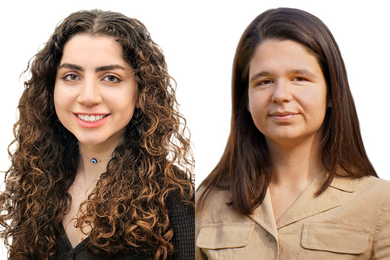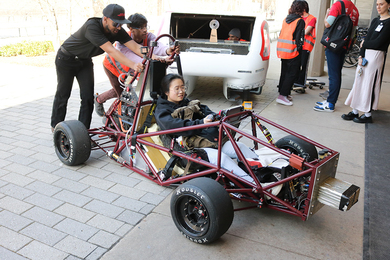Three alumni class funds will underwrite seven new undergraduate education initiatives this academic year, chosen for their creative and innovative approaches to the improvement of undergraduate education and teaching. The Class of 1951 Fund for Excellence in Education, Class of 1955 Fund for Excellence in Teaching and the Class of 1972 Fund for Educational Innovation were all established to improve the quality of teaching at MIT through annual grants to faculty members for projects related to this goal.
Project proposals for the 2001-2002 academic year will be solicited early in the spring term. Faculty who have questions should contact Peggy Enders, co-director of Academic Services and associate dean of curriculum support in the Office of the Dean for Undergraduate Education.
In June, awards were made to the following projects:
New Undergraduate Lab Course on Functional Imaging of the Human Brain -- Professor Nancy Kanwisher is using her award to design a new 16-unit lab class in the Department of Brain and Cognitive Sciences (BCS). Students in this class will have a chance to design and run their own brain-imaging experiments, and analyze the results of their fMRI and those of others.
Restructuring Organic Chemistry -- Under the guidance of Professor Daniel Kemp, two seniors, Eric Chang of biology and Dan O'Connell of chemistry, will develop learning aids for 5.12 Organic Chemistry I, a class taken by 350 students a year that is a prerequisite for many classes in different departments. Learning aids under development by Mr. Chang and Mr. O'Connell include a student workbook, an Internet program and a teaching assistant guidebook.
Computer-Based Multimedia Demonstrations in Psychology -- Subject 9.00 Introduction to Psychology enrolls 300 students a term, roughly half of whom are freshmen. This award provides funding to Professor Steven Pinker of BCS to develop computer-generated audio, video and animated teaching materials. Professor Pinker plans to integrate these resources with lecture materials for use both in the classroom and on a web site for student use.
Use of the Geotechnical Centrifuge to Integrate Physical Modeling of Large Scale Engineering Problems -- As part of a major redesign of programs in the Department of Civil and Environmental Engineering, Professor Patricia Culligan's award will provide funds to use the MIT Balanced Arm Centrifuge to provide hands-on experience and problem-based learning to students in 1.031 Geotechnical Engineering Design. Student teams will build scale models of their geotechnical engineering problems to be tested on the centrifuge, allowing them to see the effect of their engineering design.
Essentials of Engineering -- Funding for the proposal by Professors Thomas Eagar, head of the Department of Materials Science and Engineering, and Paul Lagace, co-director of the Leaders for Manufacturing Program, will help create the first undergraduate subject to be offered by the new Engineering Systems Division. Essentials of Engineering will be a second-term freshman elective designed to permit investigation of different disciplines through case studies of the development of major engineering systems. Faculty from several engineering departments will contribute to class projects aimed at developing the skills needed for effective engineering communication and leadership.
Environmental Case Study Development -- Professor Jeffrey Steinfeld of chemistry; Professor Donald Sadoway of materials science and engineering; and Matthew Gardner, a post-doctoral assistant in the Center for Environmental Initiatives (CEI) have received resources for the creation of a curriculum using the wide-ranging research programs currently underway within the CEI. The results of this research, incorporated into classroom teaching in 3.091 Introduction to Solid-State Chemistry and 5.23 Atmospheric Chemistry, will allow students to examine a series of case studies that emphasize the connections between theory and practice, to help build awareness of industrial impact on the natural environment.
Faculty Development Workshops to Redesign the First-Year Curriculum in Writing -- Funding provided for Dr. Rebecca Faery, director of First Year Writing, will be used to support faculty development workshops for first-year curriculum teaching staff in the Program in Writing and Humanistic Studies. Within the workshops, faculty will be given the opportunity to review theory and practice, develop syllabi and discuss strategy, methods and the effective use of information technologies.
A version of this article appeared in MIT Tech Talk on September 27, 2000.





